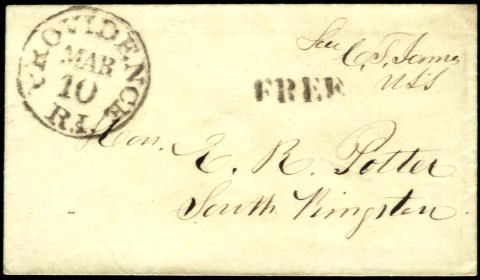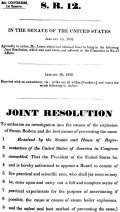![]()
Postal History Introduction
Stampless
Covers
1846
to 1900 Issues
1901-1950
Issues
1951-2003
Issues
Cancels
&
Miscellaneous
Postal
Stationery
Post
Cards
Air
Mail
First
Day &
Event Covers
Parcel Post/Special Delivery
Registered & Official Mail
Commercial & Advertising
Revenue & Postage Due
Wildlife & Game Issues
Complete List of RI Issues
|
Rhode Island Stampless
Covers & Letters |
||
|
||
|
Stamped: Free & signed C. T. James USS (United States Senate) |
||
|
Senator Charles Tillinghast James was born in West Greenwich, Rhode Island in 1804. James received no formal education, but was trained in mechanics as an apprentice in various machine-shops and textile factories. He moved to Providence some time after 1824 and assumed the position of Superintendent at Slater's Steam Cotton Mills. He was also chosen as Major General of the Rhode Island Militia. Senator James left Providence during the early 1830s and moved to Newburyport, Massachusetts, where he was involved in the construction of the Bartlett and James Mills. He also built cotton mills in Salem, Massachusetts and in New York, Pennsylvania, Indiana, and Tennessee. He returned to Rhode Island in 1849 and built the Atlantic Delaine Mill in Olneyville. Senator James was elected to the United States Senate from Rhode Island in 1851 and subsequently served in the 32nd, 33rd and 34th congresses until his retirement in 1857. After Senator James retired he began research on several inventions including a rifled cannon and a new type of projectile. Senator James was awarded an honorary Master of Arts degree by Brown University in 1838. He was the author of several articles concerning the culture and manufacture of cotton in the south. Charles Tillinghast James died of wounds received from an ordinance explosion during experiments on a new shell of his own manufacture on October 17, 1862 at Sag Harbor, New York. |
||
|
||
|
Elisha Reynolds Potter, Jr. was born in South Kingstown, Rhode Island on June 20, 1811. He graduated from Harvard University in 1830 and after studying law became a member of the Rhode Island Legislature. He served as Adjutant-General of Rhode Island from 1835 to 1837 and as a member of the United States Congress from 1841 to 1845. Elisha Potter served as the State Commissioner of Public Schools from 1849 to 1854 and then returned to the practice of law. He subsequently served as a Judge on the Rhode Island Supreme Court. Elisha was an active member of the Rhode Island Historical Society and was the author of "Early History of Narragansett" in 1835. Judge Potter died in South Kingstown on April 10, 1882. This is
the second Free Frank to E
.R. Potter from a Rhode
Island Senator that I've added to the collection. Both of the
two Free Franked covers are small covers and are of a size to
hold a standard business card or invitation. This Cover also has
a small black border and could be a death notice or Funeral
notification, as it was a common practice at the time to use
black borders on that type of mail. I received a copy of Senator James' obituary as published in the Providence Journal, Morning Edition of October 18, 1862 thanks to the friendly and very helpful librarians of the Providence Library and have reproduced it below. |
||
|
Providence Journal - October 18, 1862 The family of General James yesterday received the intelligence that the wounds received by him on Thursday from the accidental explosion of a shell while experimenting with one of his guns at Sag Harbor, resulted in death on Friday morning. Gen. James was born in the town of West Greenwich, in this State, in the year 1804, and was bred to the trade of a carpenter. He early manifested that extraordinary mechanical talent which has given him so much distinction. When he removed to this city, it was for the purpose of assuming the superintendence of the Steam Mill on Eddy Street then belonging to the late John Slater, Esq. It was during this residence here, that he was elected Major General of the militia of Rhode Island. In 1838 he received the honorary degree of Master of Arts at Brown University. From Providence he went to Newburyport, where he erected the Bartlett and James Mills. Afterward he build the large cotton mill in Salem and still later, mills in the States of New York, Pennsylvania, Indiana and Tennessee. After resuming his residence here, he built the Atlantic De Laine Mill in Olneyville. In 1851, he was elected for a full term of six years to represent this state in the Congress of the United States. After his retirement from the Senate, he devoted himself to various business enterprises, the chief of which was the new projectile that bears his name, in the ultimate success of which he had the most entire confidence. In all military arms he was remarkably expert, and for years was regarded as one of the best marksmen with the rifle in the State. General James was a man of uncommon energy and perseverance. No disaster, no adversity, could overcome his confidence in the final success of the schemes on which he built his hopes of fortune and fame. He was a man of fine presence, good address, and had the rare faculty of bending even strong wills to his own. He was kind, companionable, and always generous and charitable beyond his means. He leaves a widow and four children. One of his daughters is the widow of Colonel John S. Slocum, who fell in the first disastrous fight at Bull Run. |

RI Historical
Society
Introduction
Stampless I
Stampless II
Stampless III
Stampless IV
Stampless V
Stampless VI
Brown & Ives Letters
The Hazard Family Letters
Joseph Tillinghast
Free Franked Letters
DeWolf Family Letters
Recently Added Pages

